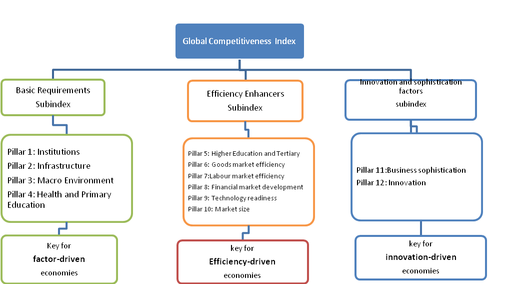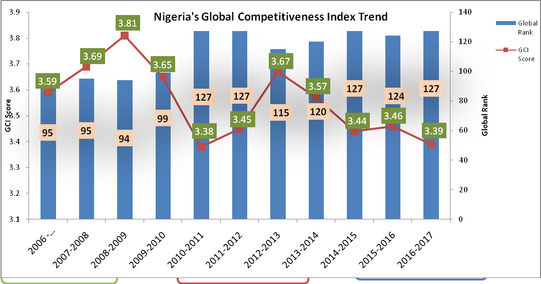BUSINESS ESSENTIALS Vol 3 No 23
Dear Esteemed Member,
Against the backdrop of the recently released World Economic Forum’s report of the Global Competitiveness Index with the appalling ranking of Nigeria which also validated the already known state of both the economy and our national disincentive to business. We therefore, did a critical review of the Global Economic Review and Nigeria Competitiveness
We also shared with you highlights from the International organisation of Employers (IOE) on the vital Role of the Private Sector in achieving the Sustainable Development Goals (SDGs). Our regulars were not left out.
Have a pleasant reading.
Timothy Olawale
Editor
In this Issue:
- Global Economic Review and Nigeria Competitiveness
- Economic Strategies for Employees during Economic Recession
- Employers highlight the critical Role of the Private Sector in achieving the Sustainable Development Goals
- LABOUR & EMPLOYMENT LAW: Jurisdiction of the National Industrial Court (Mr. Slawomir Panta vs. Dal Trade Nigeria Limited) (2014) 50 N.L.L.R. Pt 166, P. 417 NIC
- Upcoming Training Programmes
Global Economic Review and Nigeria Competitiveness: Recently, the World Economic Forum (WEF) released its Global Competitiveness Index (GCI) report which measured a set of institutions, policies and factors that set sustainable current and medium-term levels of economic prosperity. The Global Competitiveness Index (GCI) had 114 indicators that capture concepts that matter for productivity and long-term prosperity. These indicators were Source: WEF/NECA Research grouped into 12 pillars: institutions, infrastructure, macroeconomic environment, health and primary education, higher education and training, goods market efficiency, labour market efficiency, financial market development, technological readiness, market size, business sophistication, and innovation. These pillars were in turn organized into three subindexes: basic requirements, efficiency enhancers, and innovation and sophistication factors. The three subindexes were given different weights in the calculation of the overall Index, depending on each economy’s stage of development, as proxied by its GDP per capita and the share of exports represented by raw materials.
How Nigeria fared among comity of nations (the report captures 138 countries).
| Global Competitiveness Index: Top 10 Countries | ||||||||
| Sub Indexes | ||||||||
|
Country/Economy |
Overall Index | Basic Requirements | Efficiency Enhancers | Innovation and Sophistication Factors | ||||
| Global Rank | GCI Score | Rank | Score | Rank | Score | Rank | Score | |
| Switzerland | 1 | 5.81 | 2 | 6.29 | 3 | 5.62 | 1 | 5.80 |
| Singapore | 2 | 5.72 | 1 | 6.37 | 2 | 5.73 | 12 | 5.25 |
| United States | 3 | 5.70 | 27 | 5.43 | 1 | 5.85 | 2 | 5.63 |
| Netherlands | 4 | 5.57 | 4 | 6.12 | 9 | 5.38 | 6 | 5.52 |
| Germany | 5 | 5.57 | 10 | 5.94 | 7 | 5.40 | 3 | 5.61 |
| Sweden | 6 | 5.53 | 7 | 6.06 | 12 | 5.31 | 5 | 5.54 |
| United Kingdom | 7 | 5.49 | 23 | 5.61 | 5 | 5.5 | 9 | 5.30 |
| Japan | 8 | 5.48 | 22 | 5.62 | 10 | 5.37 | 4 | 5.57 |
| Hong Kong SAR | 9 | 5.48 | 3 | 6.23 | 4 | 5.58 | 23 | 4.80 |
| Finland | 10 | 5.44 | 12 | 5.88 | 14 | 5.26 | 7 | 5.47 |
Source: WEF/NECA Research Global Ranking: Out of 138 countries; GCI Score: out of 7
| Global Competitiveness Index: Top 10 African Countries | ||||||||||
| Sub Indexes | ||||||||||
|
Country/Economy |
Overall Index | Basic Requirements | Efficiency Enhancers | Innovation and Sophistication Factors | ||||||
| Global Rank | Africa Rank | GCI Score | Rank | Score | Rank | Score | Rank | Score | ||
| Mauritius | 45 | 1 | 4.49 | 39 | 5.05 | 62 | 4.19 | 48 | 3.85 | |
| South Africa | 47 | 2 | 4.47 | 84 | 4.37 | 35 | 4.62 | 31 | 4.18 | |
| Rwanda | 52 | 3 | 4.41 | 53 | 4.74 | 81 | 3.93 | 54 | 3.76 | |
| Botswana | 64 | 4 | 4.29 | 55 | 4.71 | 84 | 3.89 | 90 | 3.42 | |
| Morocco | 70 | 5 | 4.20 | 51 | 4.80 | 88 | 3.87 | 86 | 3.46 | |
| Namibia | 84 | 6 | 4.02 | 75 | 4.43 | 94 | 3.79 | 77 | 3.51 | |
| Algeria | 87 | 7 | 3.98 | 88 | 4.33 | 110 | 3.55 | 119 | 3.12 | |
| Tunisia | 95 | 8 | 3.92 | 79 | 4.41 | 103 | 3.65 | 104 | 3.32 | |
| Kenya | 96 | 9 | 3.90 | 115 | 3.81 | 75 | 4.03 | 40 | 4.03 | |
| Cote d’Ivoire | 99 | 10 | 3.86 | 104 | 3.97 | 96 | 3.73 | 75 | 3.53 | |
| Nigeria | 127 | 26 | 3.39 | 136 | 3.06 | 85 | 3.88 | 110 | 3.26 | |
Source: WEF/NECA Research. Global Ranking: Out of 138 countries; GCI Score is out of 7
Nigeria’s competitiveness has slightly weakened year on year, mainly as a consequence of deteriorating macroeconomic environments. Public finance has been put under stress by economic slowdowns among trading partners and persistently low commodity prices, which affect the country. These factors help to explain why growth has dropped from 3.81 percent in 2008 (the highest since 2006) to only 3.5 percent in 2016.
Short-run pressure on public funds may have long lasting effects on Nigerian economies by reducing much needed investments in infrastructure and education, while higher uncertainty about the country’s financial risks could shrink private investments. Slower growth and falling commodity prices have already started to affect the financial sector, reducing liquidity and tightening credit conditions. As a result, although the banking system remains generally solid, access to finance is mentioned more often as a problematic factor for doing business in the country.
Improvements have been achieved in the business environment, information and communication technologies, and infrastructure, but these have been insufficient to improve overall productivity levels. Continued progress in these areas will be challenging, given low commodity prices and low growth trajectories in advanced and emerging economies—but progress is necessary, as these countries are among the areas where Nigeria still has the largest disparities with the world’s most competitive economies. Improving infrastructure, technological readiness, and health and primary education continue to be the country’s main priorities as the nation seeks to reap the demographic dividend by creating more employment opportunities for the millions of youth who will enter the labour market every year.
The figure below shows Nigeria’s ranking and Global Competitiveness Index scores in the last six years.
Source: WEF/NECA Research
In our subsequent editions, we will give further analysis on the country’s performance in each of the 12 pillars under the three subindexes: basic requirements, efficiency enhancers, and innovation and sophistication factors, starting with the basic requirements.
Economic Strategies for Employees during Economic Recession
All economic indicators have shown that economic conditions are going to be a lot tougher in the months to come. The level of economic uncertainties would gain momentum, as recession shock waves spread across the nation. The economic buffers from FG are yet to be rolled out against the impending economic problems. This means, you are all alone to fight this for now, even with less money to spend due to high inflation and growing cost of core basic needs like Transport, Drinking Water, Feeding, Rent, Clothing, Electricity, Waste-Disposal, Children School Fees, Healthcare, etc. You will agree with me that there is need for a detailed plan to survive the approaching storm.
- The Need for Personal Economic Master Plan is Urgent
Let me first warn, that as an employee or salary earner, don’t underestimate the need for detailed financial plan. You will seriously need your Personal Economic and Financial Plan in place to quickly reorganise, readjust and reposition yourself before the impending economic woes fully gain momentum. If you don’t have one, please you need to have it now. Also, it is important you know ahead that the tide is already against, as you are treading against many odds and you will have less ‘Real Money’ and less Purchasing Power to fight this battle alone because of the impact of growing inflation rate, devaluation of naira and other regular deductions from your fixed salary.
- Have an Emergency Fund
The need to plan for emergency fund is extremely necessary during recession. Setting aside certain percentage of your income is very important not only during recession, but it makes more sense during economic adversity. No matter how small, it is more necessary than important to have an emergency fund- even if you are still going to borrow, you are already half-way.
Your emergency fund can be diversified in T-bills and Dividend paying stocks. You can invest as low as N10,000 monthly into T-bills and N10,000 into Stocks as well but occasionally, you can do lump-sum. The beautiful thing about such emergence fund is that it retains value against inflation. Those with strong emergency funds have greater chance to survive a recession.
- Create another source of income:
Another source of income would help you greatly, any passive business that can give you at least 25% of your monthly income would be a great idea to explore this time of recession. Affiliate and network marketing are very good example. If you like to write or read, you may consider blogging to share your passion or knowledge. All these would not cost you more than your past time.
- Readjust Your Spending Habit:
The best way to avoid growing debt is to leave within your income and means. The main reason for this is simply because the prices of basic needs are not always stable during recession, they tend to go up often and this may lead to borrowing if you have not disciplined yourself to leave within your means.
- Reduce Expenses and Cut-down on debt
First, focus on your needs NOT want. I strongly suggest you reduce your debt, particularly the high interest debt. It is not advisable to go into recession with such debt, do everything possible to pay down your debt because rates/interest would swing northward during recession and that would result in a counter-productive situation as your monthly expenses would surge. You can make use of no-interest loan a lot, you can make use of it to settle high interest loans. Islamic cooperatives/finance is remarkably and fantastically great in this area of no interest loan.
- Learn how to negotiate, re-negotiate and use leverage:
It is important you try to acquire negotiation skills; it will help you greatly during recession. You can ask for instalment payment (cash-payment plus post-dated cheque, etc). All this is just to re-align your cash-flow to meet my obligations. For parents, you can negotiate for monthly payment of your children/wards school fees with school. It is important you always negotiate to suit your cash-flow.
Employers highlight the critical Role of the Private Sector in achieving the Sustainable Development Goals
The private sector made key contributions to the second African Regional Meeting of the EU Policy Forum on Development in Dakar on 3-4 October 2016, ensuring the global voice of business informed the deliberations. The Policy Forum on Development (PFD) was launched by the European Commission in November 2013 after a consultation process with civil society organisations and local authorities from all regions of the world. Its overarching goal is to provide a space for EC-level dialogue that ensures effective multi-stakeholder consultation and contribution to EU development policies and programmes.
The Dakar event provided a further venue for the private sector, represented by the IOE with the support of Business Africa and the Federation of West African Employers’ Associations, to participate in the dynamic discussions and debates with their perspectives on how the involvement of the private sector is integral to the achievement of the Sustainable Development Goals (SDGs).
Frederick Muia, Senior Adviser at the IOE, contributed to a panel on the challenges for development cooperation actors in fragile settings, highlighting the decisive role of employment creation in preventing fragility and migration, as well as the importance of promoting skills and entrepreneurship.
Anetha Awuku, IOE Project Manager, spoke on Africa’s role and experiences to date, with a particular focus on the need for an enabling environment for the implementation of the 2030 Agenda. She shared initiatives by business, underlining the work represented by the Blueprint for Jobs in Africa and the Jobs for Africa Foundation.
Business Africa’s Secretary-General Jacqueline Mugo, and the Federation of West African Employers’ Associations’ Executive Secretary Ousseine Diallo both reaffirmed the commitment of employers from their regions to play their part in the implementation of the 2030 Development Agenda.
The Dakar meeting also provided an opportunity to prepare the agenda for the next global PFD meeting which will take place in Brussels in March 2017.
The IOE has been increasingly successful in securing the private sector’s inclusion in these multi-stakeholder dialogues – an effort further reflected in the recently announced IOE-EU project which will bring a number of joint activities to the continent.
LABOUR & EMPLOYMENT LAW: Jurisdiction of the National Industrial Court (Mr. Slawomir Panta vs. Dal Trade Nigeria Limited, 2014) 50 N.L.L.R. Pt 166, P. 417 NIC
Facts:
- The claimant (Mr. Slawomir Panta) filed his complaint against the defendant, claiming the following:
Ø The sum of N81,101,367.00 being amount due to the claimant as terminal benefits and gratuities on the contract of employment between the parties
Ø An Order that all the monies/dividend already declared on the 3,795 share owned by the claimant by the defendant be paid
Ø An Order that subsequent monies/dividend on the claimant’s shares (3,795) for year 2010 and subsequent years be paid to him
Ø Interest on the total amount of money claimed at the prevailing bank rate
- In response, the defendant filed a notice of preliminary objection, praying for the striking out of some paragraphs of the claimant’s Statement of Fact and the Claims for payment of Dividend for not being within the competence and jurisdiction of the National Industrial Court
Issues
- Whether the National Industrial Court has jurisdiction to entertain the suit.
The Judgement
On Relationship between Jurisdiction and Competence of Court:-
It is trite law that jurisdiction is inextricable from the competence of a court. This is against the backdrop of the fundamentality of jurisdiction to the adjudicatory powers of a Court. (See also: Madukolu vs. Nkemdilim (1962) 2 SCNLR 341; (1962) 1 All NLR Pt.4, Page 587)
On Meaning, Nature and Limit of the Jurisdiction of a Court:-
Jurisdiction is said to be the authority a Court has to decide on any issue brought before it for its decision. It is the foundation or bedrock of adjudication. The limits of this authority are imposed by the Constitution, Statute, Charter or Commission under which the court is constituted and may be extended or restricted by similar means. (See also: Obasanjo vs. Yusuf (2004) 9 NWLR Pt.877, Page 437).
On relevant determinants of jurisdiction of court where objection is raised thereto:-
When considering the relevant determinants of the jurisdiction of court to hear a matter when objection is raised as to the exercise of such jurisdiction, the jurisdiction of the court will be determined by the subject-matter of the claim and not the claim relating to the injunction which was an ancillary relief and depends on the primary claim. In the instant case, in deciding whether or not the court has jurisdiction to entertain the suit as regards the payment of dividends of the claimant, recourse should be made to the claim of the claimant’s Statement of Fact.
On whether National Industrial Court has jurisdiction over Director’s fees and claims for dividends/debt:-
Issues bordering on non-payment of Directors’ fees are outside the jurisdiction of the National Industrial Court. The Court also has no jurisdiction over claims for dividends/debt.
On whether National Industrial Court has exclusive jurisdiction over all matters arising from the workplace:-
The National Industrial Court does not have exclusive jurisdiction over all matters arising from the workplace. To follow this instance means that even a case of libel which is an independent tort should be handled by the court. When the court is faced with issued of this nature, what should be considered is whether the law/rules needed to resolve the matter at hand are employment law rules. If the answer is Yes, it then means that the court can safely assume jurisdiction, but if it is in the negative, that means that the court would not exercise jurisdiction over the matter.
Final Judgment:-
The Court upheld the preliminary objection of the defendant and struck out some paragraphs of the claimant’s Statement of Fact and the Claims for payment of Dividend for not being within the competence and jurisdiction of the National Industrial Court, as it had to do with payment of dividends and was within the operation of the Company and Allied Matters Act.
OPINION:
Where the exercise of a power of court is statutory, such power can only be exercised within the limits prescribed by the statute.
UPCOMING TRAINING PROGRAMMES
1) Theme: Nigerian Labour, Employment & Current Social Laws: Managing Legal Risks in HRM
Date: 9th – 11th November, 2016
Venue: NECA Learning Centre
Fee: N110,500 (NECA Members) N115,500 (Non-NECA members)
Time: 9:00am – 4:00pm
2) Theme: Entrepreneurship Development Workshop for Managers and Potentials Retirees
Date: 15th – 17th November, 2016
Venue: NECA Learning Centre
Fee: N110,500 (NECA Members) N115,500 (Non-NECA members)
Time: 9:00am – 4:00pm
3) Theme: Negotiation: Strategy for Business Transaction and Relationship
Date: 24th – 25th November, 2016
Venue: NECA Learning Centre
Fee: N82,500 (NECA Members) N87,500 (Non-NECA members)
Time: 9:00am – 4:00pm
For further details please contact Adewale (08069720364) adewale@neca.org.ng Visit www.neca.org.ng
| For Advert Placement: kindly contact Timothy Olawale on tim@neca.org.ng, 08033435439 |








Recent Comments